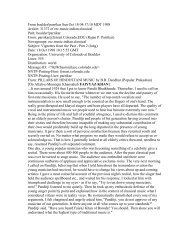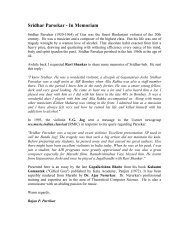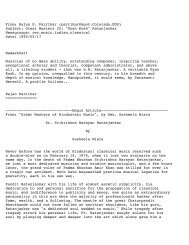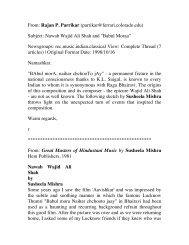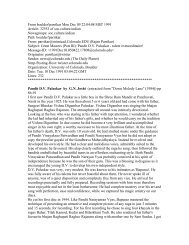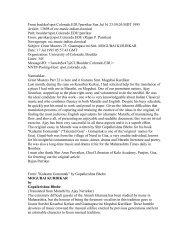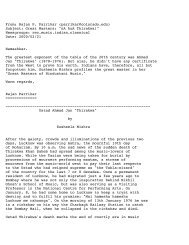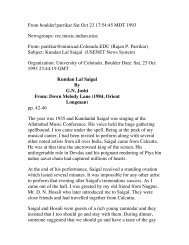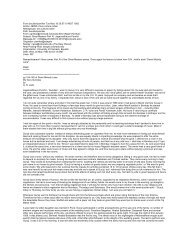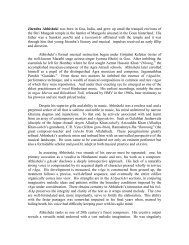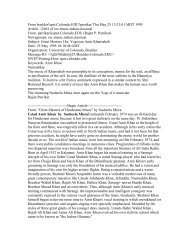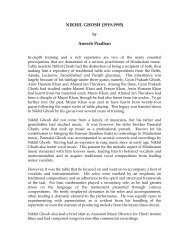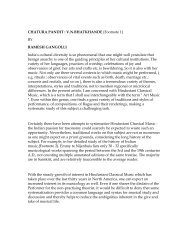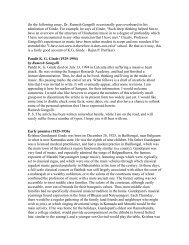Rajab Ali Khan (1874-1959), born in Narsingarh, Madhyam Pradesh ...
Rajab Ali Khan (1874-1959), born in Narsingarh, Madhyam Pradesh ...
Rajab Ali Khan (1874-1959), born in Narsingarh, Madhyam Pradesh ...
Create successful ePaper yourself
Turn your PDF publications into a flip-book with our unique Google optimized e-Paper software.
<strong>Rajab</strong> <strong>Ali</strong> <strong>Khan</strong> (<strong>1874</strong>-<strong>1959</strong>), <strong>born</strong> <strong>in</strong> Nars<strong>in</strong>garh, <strong>Madhyam</strong> <strong>Pradesh</strong>, learnt music from<br />
his father Manglu <strong>Khan</strong>, Amritsen (Senee) and Bade Mohammad <strong>Khan</strong> (Gwalior). He<br />
was a court musician of Dewas and Kolhapur. In his day, <strong>Rajab</strong> <strong>Ali</strong> <strong>Khan</strong> was known as<br />
much for his tremendous musical acumen as for his picaresque ways. A master vocalist,<br />
he was also proficient on the Rudra Veena, Sitar and Jala-Tarang. Several musicians of<br />
high stand<strong>in</strong>g learnt from him, among them his nephew Aman <strong>Ali</strong> <strong>Khan</strong> of the<br />
Bhendibazar Gharana (and through Aman <strong>Ali</strong> the <strong>in</strong>fluence extended to Amir <strong>Khan</strong>),<br />
Nivruttibuwa Sarnaik, Ganpatrao Dewaskar and others. Lata Mangeshkar, too, briefly<br />
took tAleem from <strong>Rajab</strong> <strong>Ali</strong> dur<strong>in</strong>g her st<strong>in</strong>t under Aman <strong>Ali</strong>.<br />
<strong>Rajab</strong> <strong>Ali</strong> <strong>Khan</strong>'s capers have been recorded <strong>in</strong> Prof. B.R. Deodhar's book Pillars of<br />
H<strong>in</strong>dustani Music (Popular Prakashan). Some excerpts:<br />
...Have you heard of a Court case <strong>in</strong> which a shagird (formal disciple)sues the ustad for refund of<br />
fees paid by him or her at the time of the black-thread ceremony This is what happened <strong>in</strong> the<br />
case of <strong>Khan</strong>saheb <strong>Rajab</strong>alli <strong>Khan</strong>. The <strong>in</strong>terest<strong>in</strong>g feature of this case was that the Counsel for<br />
the defendant was none other than the late Pandit Vishnu Narayan Bhatkhande...<strong>Khan</strong>saheb, not<br />
be<strong>in</strong>g well-versed <strong>in</strong> legal matters, sought Pandit Bhatkhande's advice. Panditji agreed to fight the<br />
case on <strong>Khan</strong>saheb's behalf. When the matter came up <strong>in</strong> Court, Panditji argued that the<br />
payment made at the ganda-bandhan (black-thread) ceremony be<strong>in</strong>g guru-daksh<strong>in</strong>a, i.e. <strong>in</strong> the<br />
nature of a gift to the guru, the disciple can <strong>in</strong> no circumstances ask for its repayment. The Court,<br />
accept<strong>in</strong>g this reason<strong>in</strong>g, decided <strong>in</strong> <strong>Khan</strong>saheb's favour...<br />
...<strong>Khan</strong>saheb's concert tours used to cover several cities and he would earn a sizeable sum of<br />
rupees seven to eight thousand, before return<strong>in</strong>g to Dewas. Because of his prodigal ways it was<br />
not long before this fortune was spent on his own extravagances and hospitality to <strong>in</strong>timate<br />
friends. Then the borrow<strong>in</strong>gs from money-lenders, grocers, other shopkeepers and confectioners<br />
would start. The shopkeepers, know<strong>in</strong>g their customer only too well, would decl<strong>in</strong>e to supply<br />
goods on credit when the borrow<strong>in</strong>gs had crossed reasonable limits...On one occasion, the<br />
money-lenders, grocers, clothiers all stopped credit but the confectioner cont<strong>in</strong>ued to provide stuff<br />
on credit. One day a relation of <strong>Khan</strong>saheb, who lived <strong>in</strong> a distant village, came on horseback to<br />
visit <strong>Khan</strong>saheb. <strong>Khan</strong>saheb extended a cordial welcome to him and ostentatiously told him to go<br />
to a confectioner and get five or ten seers of jalebi. The guest protested that his horse ate grass<br />
and not jalebi. <strong>Khan</strong>saheb replied, "You happen to be the guest of a great artiste. Your horse,<br />
while he is under my roof, must eat jalebi." The horse was <strong>in</strong>deed fed on jalebis. <strong>Khan</strong>saheb did<br />
not have any cash even to buy fodder for the horse but s<strong>in</strong>ce the confectioner had still not cut off<br />
credit, jalebi was still obta<strong>in</strong>able...<br />
...Hav<strong>in</strong>g come to know that a visit to Vazir <strong>Khan</strong> was a must before seek<strong>in</strong>g audience with the<br />
ruler [of Rampur], <strong>Rajab</strong>alli <strong>Khan</strong> went to the former's mansion...The two went <strong>in</strong>side. <strong>Rajab</strong>alli<br />
<strong>Khan</strong>'s companion bowed low and then squatted on the ground like a lowly dependant. Vazir<br />
<strong>Khan</strong> was seated <strong>in</strong> a silver-encrusted chair. <strong>Rajab</strong>alli <strong>Khan</strong> made a bee-l<strong>in</strong>e for his seat and sat<br />
on an adjo<strong>in</strong><strong>in</strong>g chair. He even went so far as to take a few puffs on Vazir <strong>Khan</strong>'s hookah. Vazir<br />
<strong>Khan</strong>, although really very angry at this impert<strong>in</strong>ence, was outwardly calm. He politely enquired<br />
after <strong>Rajab</strong>alli <strong>Khan</strong> who replied that he was a s<strong>in</strong>ger, been player and a disciple of <strong>Khan</strong>saheb<br />
Bande <strong>Ali</strong>. Vazir <strong>Khan</strong> said, "Yes I know," and made some uncharitable remark about the k<strong>in</strong>d of<br />
<strong>in</strong>strument Bande <strong>Ali</strong> was us<strong>in</strong>g. <strong>Rajab</strong>alli <strong>Khan</strong> replied "But it had a far sweeter sound than your<br />
Rampuri drum-like been." S<strong>in</strong>ce <strong>Rajab</strong>alli's first <strong>in</strong>terview was so explosive the prospect of his<br />
be<strong>in</strong>g able to secure an audience with the Nawab was not very bright. But <strong>Rajab</strong>alli, ill-mannered<br />
as he was, had brought a letter from the Kolhapur ruler. S<strong>in</strong>ce not to grant him an <strong>in</strong>terview would<br />
be discourtesy to the Maharaja, the Nawab decided to see him.<br />
The Nawab sent for him the same night...<strong>Rajab</strong>alli used to say that the Nawab was a very skilled<br />
s<strong>in</strong>ger and his layakari (sense of rhythm) was very good. He knew <strong>in</strong>numerable dhrupads and<br />
dhamars by heart. However, he did not pay as much attention to swara (tonal purity) as he should<br />
have. After his render<strong>in</strong>g of a song, the Nawab turned to the assembled musicians and said, "Tell<br />
me, have you heard any s<strong>in</strong>ger who can equal me <strong>in</strong> layakari and tonal purity" All the musicians<br />
<strong>in</strong>stantly chorused, "No Your Highness! We have neither seen nor heard anyone of your calibre!"
Nawabsaheb turned to <strong>Rajab</strong>alli and asked, "<strong>Rajab</strong>alli, what is your op<strong>in</strong>ion" <strong>Rajab</strong>alli replied,<br />
"My op<strong>in</strong>ion is identical with what the others have said." But this somehow did not carry conviction<br />
with the Nawab. He repeatedly pressed <strong>Rajab</strong>alli for his true op<strong>in</strong>ion and f<strong>in</strong>ally asked him to<br />
swear by Allah and the Koran and give his true op<strong>in</strong>ion. Thereupon <strong>Rajab</strong>alli said "Your<br />
Highness! I have visited many pr<strong>in</strong>cely houses and palaces without com<strong>in</strong>g across any Raja who<br />
knows as much music as you do or who can s<strong>in</strong>g like you." Nawabsaheb countered this by<br />
say<strong>in</strong>g, "I am not ask<strong>in</strong>g you to say where I stand with respect to the other pr<strong>in</strong>ces. How do I rank<br />
among professional musicians I want you to tell me that." To this <strong>Rajab</strong>alli replied, "Even the<br />
children of musicians are better than you." Nawabsaheb's face grew crimson with rage when he<br />
heard this. "I would have had you shot this <strong>in</strong>stant," the Nawab barked, "but unfortunately you<br />
have come here with a letter from the Maharaja (of Kolhapur). I am helpless. But get out of my<br />
state immediately." <strong>Rajab</strong>alli was paid Rs. 500/- and expelled from Rampur without delay...



